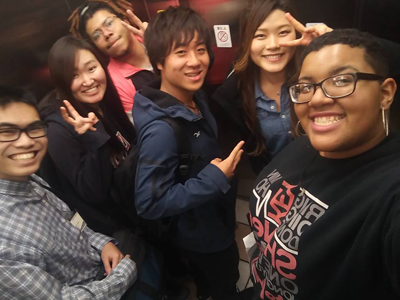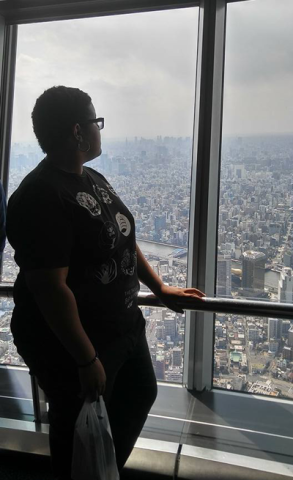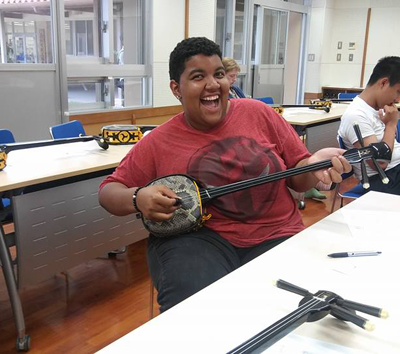No one knows the true IES Abroad Tokyo experience better than a student who has lived it—a student like Samekh Harris Reed (IES Abroad Tokyo, Spring 2017 | University of Rochester).
As an IES Abroad Tokyo alum, passionate interculturalist, and (most recently!), one of our 2019 Ambassadors of the Year, Sam is about as much of a Tokyo student experience expert as you can get. After returning to the University of Rochester post-study abroad, Sam has dedicated time to spreading knowledge and awareness through several on-campus partners.
Read more about their experience and step inside the day-to-day journey of living and learning in Japan in this myth-busting, student-authored piece.

When someone hears “Japan” some of the first things that might come to mind are anime, nintendo, sushi, and cat cafes. While Japan does have these, Japan also has a lot more to offer! Read on for the facts you need to know before you go, which will help in making an informed decision about studying abroad in Japan. I will be talking about some popular misconceptions and myths surrounding studying abroad in Japan.
Myth #1: You need to be fluent in Japanese before you go.
While having some basic knowledge about the Japanese language is great, not knowing any is also fine! Depending what studying abroad program you choose, your program provider may require that you study the language beforehand, or you might be required to take courses during your duration abroad. I knew very little Japanese before I went, so I was very nervous about getting lost in Tokyo one day. But! In Tokyo, English is everywhere! Street signs are translated, train stations switch to the English version of their announcements (as well as Korean and Chinese from what I observed), and overhead announcements are at times translated into English, as well. However, I encourage you to still learn as much Japanese as possible before you go. While Tokyo was full of English, if you plan to travel across Tokyo to other cities, suburbs, or islands, English may not be as prominent. A "sumimasen" (すみません, "excuse me" or "I'm sorry") here and "arigatou gozaimasu" (ありがとうございます, "thank you") there will not only keep you from possibly getting lost, but you can ask locals for help! I encourage you to not go abroad with the assumption that everyone knows fluent English, just as you are not expected to know fluent Japanese.

Myth #2: I have dietary needs and can’t eat fish/sushi, so I can’t go.
While you may be unable to go eat conveyor belt sushi, you still have many options to choose from! While sushi and fish are great (in my opinion), Japan has various food options to choose from. Whether you like barbecue, ramen, udon, yaki-niku, shabu-shabu, or sweets, there is some type of food for you. I had a friend with me abroad who did not eat any seafood whatsoever, and she never went hungry. I encourage you to do some research and reach out to YouTube, your program provider, Ambassadors of your program, friends, and of course, Google, to see what your options are. Chances are, there is in fact something for your tastebuds.
Myth #3: I don’t like Anime or Nintendo, so what would be the point of going to Japan?
Would you like to hike Mt. Fuji? What about creating a goshuincho book and collecting shrine stamps? Would you like to visit rice paddies? See the largest Buddha statue? Go to a Sumo match? Relax in an onsen (Japanese hot spring)? See a Kabuki theater performance? Wear a kimono? Visit a snake cafe? Shop in Harajuku? Go to the Momofuku Ando Instant Ramen Museum? Go—honestly, I think you get the point by now. You don’t have to like anime or Nintendo to go to Japan!
While there are many districts that cater to pop culture (i.e., Ikebukuro and Akihabara), Japan is rich in history, traditions, and has plenty of adventures for you to try. During your time abroad, I hope you have a chance to go outside of Tokyo. Japan is not only Tokyo, but also Osaka, Kyoto, Hiroshima, Enoshima, Nara, Yokohama, Nagasaki, and more! Maybe you don’t want to go visit the One Piece Tokyo Tower (which is amazing), but how about feeding wild deer and having them bow to you in Nara? One size doesn’t fit all, so make sure to find something that suits you before you commit.
Myth #4: If I don’t understand the culture, I’ll be ostracized.
There’s a reason why you wanted to go to Japan, right? Or there’s something about Japan that you’re curious about? Curiosity is needed! Curiosity may have killed the cat, but satisfaction brought them back. Be curious! Ask questions! If you are not comfortable asking questions out loud, then maybe one-on-one with a peer, advisor, homestay parent, or whoever you feel comfortable talking to (Google is once again an option) will be just as helpful. You are not expected to know everything about a foreign country or culture. The only expectation of you is that you are open-minded and respectful. If you are ever unsure of something or would like more information, chances are someone has an answer! If not, then go forth and find an answer.

Myth #5: Japan is expensive, and I can’t afford to go.
Are you sure? Studying abroad in Japan may not be as expensive as you think. I encourage you to apply early for your abroad program so you can plan early for your trip expenses.
Before you go abroad, see if your program provider may have their own scholarships and need-based financial aid available that you may be eligible to apply to. Also, If you are a student and you receive financial aid from your college, that financial aid may roll over to cover some expenses for you abroad. And, should your time abroad be cheaper than your time at your home institution, the extra aid money may be given to you as a refund check for your own personal use! Besides these methods, look into Gofundme or other platforms to create a page to raise money for yourself. Look into scholarships that relate to your identity, you’d be surprised at how many scholarships are out there that you can apply to! And, most importantly, save money from whatever work you can do if possible.
When you get there, do not fall into temptation of buying everything you see! You may think “I’m only gonna be here once, so I might as well buy whatever” (I was very guilty of this thought), and as tempting as this seems, you must resist. Chances are, you’ll find the thing you want way cheaper at another store. Make a note of everything you might want, and see if you can find it cheaper somewhere. For example, I wanted a 5,000 yen (roughly $45) Snorlax plush, but I didn’t want to spend that kind of money. Eventually, I saw the same plush for 2,100 yen (roughly $18) at another store! Yes, I got the plush. Moral of the story: Please stay mindful of your budget.
Overall:
Sometimes studying abroad is difficult, sometimes you may encounter situations that frustrate you and, who knows, maybe you won’t be as in love with Japan as I am. Studying abroad is incredible, but not always.

While I hope this article was helpful, please continue to look into Japan and see if it’s right for you. In the end, I hope you study abroad and especially, I hope you study abroad in Japan!
*This article is to help current and future individuals thinking about studying abroad in Japan. As a disclaimer, all information provided is from my own experiences. I deeply encourage you to keep doing research and asking questions about Japan before you go.*
Thank you, Sam, for sharing your Japan study abroad expertise! Learn more from students like Sam—including our other 2019 Ambassador of the Year, Collin Thomas!—by contacting an Ambassador today.

